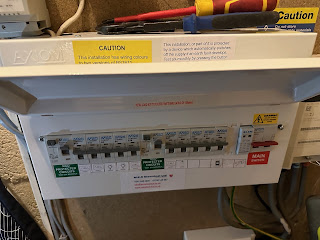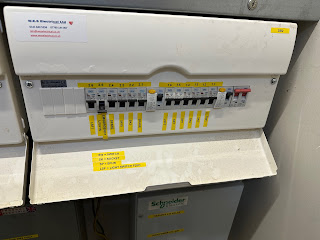When electrical issues strike unexpectedly, they can pose serious risks to your property and safety. Whether you’re facing a sudden power cut, dangerous electrical fire, or faulty wiring, you need experienced emergency electricians you can rely on.
At WES Electrical, we provide 24/7 emergency call-out services across Glasgow and the surrounding areas. Our fully qualified team is equipped to handle any electrical emergency, ensuring your home or business is safe and compliant with current regulations.
In this blog, we’ll cover:
✅ The most common electrical emergencies and how to identify them.
✅ The risks of delaying emergency repairs.
✅ The importance of fast, reliable response times.
✅ Areas covered by WES Electrical in and around Glasgow.
✅ Proactive tips to prevent electrical emergencies.
EICR Certificates Westend Glasgow
Electrical emergencies can happen at any time, and acting quickly is essential to prevent further damage or danger. Here are some of the most frequent issues we respond to:
🔥 1. Electrical Fires – A Serious Hazard
Electrical fires are one of the most dangerous emergencies you can face. They can be caused by faulty wiring, overloaded circuits, old fuse boards, or malfunctioning appliances. These fires spread quickly, damaging property and endangering lives.
🔥 Warning Signs of Electrical Fire Risk:
A burning smell or plastic-like odour near outlets or appliances.
Scorched sockets or discoloured faceplates.
Flickering lights or frequent circuit trips.
Buzzing or crackling sounds from the fuse board.
🚨 Emergency Action:
Turn off the power: If safe to do so, switch off the main consumer unit to cut power to the affected circuit.
Evacuate immediately if you see flames or heavy smoke.
Call WES Electrical for an emergency response – we’ll identify the fault, make safe repairs, and recommend fire prevention measures.
⚡️ 2. Sudden Power Cuts or Blackouts
Unexpected power cuts can occur due to faulty internal wiring or external supply issues. While scheduled outages from the grid provider are normal, internal blackouts indicate a fault within your property.
🔌 Common Causes of Blackouts:
Blown fuses or faulty breakers.
Damaged or exposed wiring.
Overloaded circuits tripping the supply.
Issues with the consumer unit or main service connection.
✅ Emergency Action:
Check the consumer unit: If only part of your property has lost power, it could be a tripped breaker.
If the entire property is without power, check with your energy provider first to confirm if it’s a grid outage.
If not, call WES Electrical for a thorough inspection.
Residual Current Devices (RCDs) and Residual Current Breaker with Overcurrent (RCBO) are essential safety devices that cut power when they detect faults. Frequent or random tripping indicates an underlying issue.
⚠️ Common Causes of RCD/RCBO Tripping:
Water ingress into sockets or light fittings.
Faulty appliances causing earth leakage.
Damaged or deteriorated wiring insulation.
Overloaded circuits, especially in older properties.
🚨 Emergency Action:
Don’t repeatedly reset the RCD – this could worsen the fault.
Unplug all appliances and reset the breaker.
If the issue persists, contact WES Electrical immediately. We’ll diagnose and repair the fault safely.
⚡️ 4. Electric Shocks – A Major Warning Sign
Receiving an electric shock from a switch, socket, or appliance is a clear indication of a serious fault. Even minor shocks can signal faulty wiring or poor earthing, putting you at risk of electrocution.
⚠️ Causes of Electric Shocks:
Damaged wiring insulation exposing live parts.
Incorrectly wired or reversed polarity sockets.
Lack of proper earthing or bonding.
Malfunctioning appliances with internal faults.
✅ Emergency Action:
Stop using the affected outlet or appliance immediately.
Shut off the power to the affected circuit.
Call WES Electrical – we’ll identify the fault, repair it, and perform thorough safety testing.
🔥 5. Overheating Consumer Units (Fuse Boards)
Your fuse board is the heart of your electrical system. Overheating can lead to meltdowns or fires, especially if your consumer unit is outdated or faulty.
⚠️ Signs of Overheating:
Warm or hot consumer unit covers.
Buzzing, humming, or crackling noises.
Scorch marks or discoloured wiring.
Frequent tripping or blown fuses.
electric shower electrician
✅ Emergency Action:
If your consumer unit feels hot, turn off the main power immediately.
Contact WES Electrical for an urgent inspection. We specialise in consumer unit upgrades with modern RCBO and AFDD protection, ensuring compliance with the latest safety standards.
💡 6. Emergency Lighting Failures (For Businesses)
For commercial properties, emergency lighting failures pose a significant safety risk. In the event of a fire or power cut, properly functioning emergency lighting is vital for safe evacuation.
⚠️ Common Causes of Failures:
Faulty batteries or charging issues.
Wiring faults or loose connections.
Control panel malfunctions.
Lack of regular testing or maintenance.
✅ Emergency Action:
Test the emergency lighting regularly to ensure functionality.
If you experience a failure, call WES Electrical for fast repairs and compliance testing.
When dealing with electrical emergencies, you need a fast, reliable, and professional service. Here’s why WES Electrical is Glasgow’s go-to emergency electrician:
✅ 24/7 Availability: We provide round-the-clock emergency response, ensuring you’re never left in the dark.
✅ Fast Response Times: Our local team covers Glasgow and surrounding areas, ensuring rapid call-out times.
✅ Fully Qualified and Certified: All of our electricians are fully licensed and compliant with the latest NICEIC regulations.
✅ Advanced Equipment: We use state-of-the-art diagnostic tools to identify and repair faults efficiently.
✅ Transparent Pricing: No hidden fees – just fair, upfront pricing for all emergency call-outs.
🌍 Areas WES Electrical Covers in Glasgow
We offer emergency electrical services throughout Glasgow and nearby areas, including:
Glasgow West End: Hillhead, Partick, Hyndland, Kelvinbridge, Anniesland, and Broomhill.
Glasgow Southside: Shawlands, Giffnock, Newton Mearns, and Cathcart.
Glasgow East End: Dennistoun, Parkhead, Tollcross, and Shettleston.
Glasgow North: Springburn, Bishopbriggs, Maryhill, and Bearsden.
Surrounding areas: Renfrew, Paisley, Clydebank, and Hamilton.
While WES Electrical is always ready to assist, prevention is key. Here’s how you can minimise the risk of electrical issues:
✅ Regular EICR Inspections: Ensure your property is inspected every 5 years (or annually for HMOs).
✅ Upgrade Old Fuse Boards: Replace outdated consumer units with RCBO and AFDD protection.
✅ PAT Testing: For landlords and businesses, regular PAT testing prevents appliance-related faults.
✅ Don’t Ignore Warning Signs: Frequent tripping or unusual smells require immediate attention.
If you’re facing an electrical emergency, WES Electrical is here to help. Our experienced team provides fast, professional service to keep your property safe.
📞 Call us now: 0141 840 5236
🌐 Visit us online: WES Electrical
✅ WES Electrical – Your Trusted Emergency Electricians in Glasgow.









